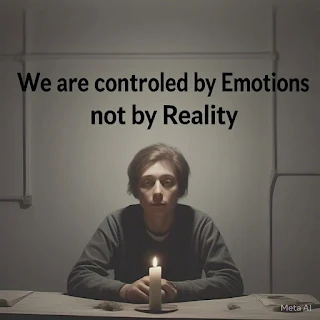We are controlled by Emotions, not by Reality
In the journey of human life, we constantly find ourselves torn between two powerful forces: emotions and reality. Emotions guide our hearts, stirring desires, love, fear, and hope. Reality, on the other hand, confronts us with facts, limitations, and consequences. Emotions or Reality: The conflict between these two often defines our experiences, decisions, and personal growth. Whether in love, ambition, relationships, or daily challenges, we are perpetually choosing between what we feel and what is. Understanding the delicate balance between emotions and reality is crucial for a mature and fulfilling life.
We are controlled by Emotions, not by Reality
Emotions are what make us human. They bring color to our lives and give depth to our experiences. When we feel joy, sorrow, anger, or excitement, we are connecting to life in a profound way. Emotions can inspire creativity, passion, and kindness. Artists, writers, and musicians often create their best work by tapping into deep emotional states. Love, for instance, is an emotion that can drive people to do extraordinary things. It motivates sacrifice, loyalty, and even bravery. Without emotions, life would be cold, mechanical, and devoid of meaning.
However, emotions can also be misleading. While they are powerful, they are not always rational. Acting solely on emotion can lead to impulsive decisions and regrets. For example, a person may feel hurt and lash out in anger, only to later realize the damage done was unnecessary and preventable. Similarly, someone might fall in love with the idea of a person rather than the reality of who they are, leading to disappointment and heartbreak. Emotions, though valid, are not always reliable guides. They are subjective and often influenced by temporary situations.
Reality, in contrast, is objective. It is the world as it exists, regardless of how we feel about it. Reality does not change because we are sad, angry, or hopeful. It remains constant. When facing reality, we must accept facts, take responsibility, and make practical choices. For instance, someone may dream of becoming a famous singer, driven by passion and emotion. But reality may reveal that they need more training, resources, or a backup plan. Facing reality requires maturity and strength. It demands that we deal with what is in front of us, rather than what we wish were true.
Yet, if we focus only on reality and ignore emotions, life becomes overly harsh and uninspiring. Living purely in reality might make a person too rigid, pessimistic, or disconnected from others. Human connection, empathy, and dreams are all fueled by emotion. Reality tells us that life has limits, but emotion gives us the hope to stretch beyond them. A balance must be found where emotion and reality coexist, each influencing the other in healthy ways. The most successful people often blend their emotional drive with realistic planning. They dream big but stay grounded.
One of the most common areas where this conflict plays out is in relationships. Emotions might tell someone to stay in a relationship because of love, fear of being alone, or comfort. Reality might show signs of toxicity, abuse, or incompatibility. Making the decision to leave a harmful situation, despite the emotional attachment, requires immense courage. It is a decision where reality must lead, even when emotions scream otherwise. On the other hand, some people may avoid commitment because of past trauma or fear, even when the reality is that they’ve found someone trustworthy. In such cases, emotion must be confronted, and reality given a chance.
Another domain is career choice. Many people grow up dreaming of becoming actors, athletes, or entrepreneurs. Passion and emotion drive them, but reality often demands hard work, education, and even failure. Balancing emotion and reality in career decisions means not giving up on dreams, but also being ready to adapt, learn, and evolve. Emotion gives the courage to pursue passion; reality gives the strategy to succeed.
In times of crisis or grief, emotions can be overwhelming. Loss, heartbreak, or failure can make the world seem unbearable. But reality teaches us that time moves forward, and healing is possible. Emotions may say, "I can’t go on," but reality whispers, "You have to." Learning to process emotions without letting them control us is a sign of emotional intelligence. Likewise, denying emotions altogether can lead to long-term mental health issues. The goal is not to silence feelings, but to understand and navigate them with awareness of reality.
The debate between emotions and reality is not about choosing one over the other. It is about understanding when to listen to each. Emotions enrich our lives and connect us to others, while reality keeps us grounded and responsible. A life lived only through emotions may be chaotic and unsustainable; a life lived only through reality may be dull and disconnected. The key is balance. When we can honor our feelings but act in alignment with truth, we find a path that is both meaningful and wise. In the end, emotions and reality are not enemies — they are partners in the human experience.





No comments:
Post a Comment